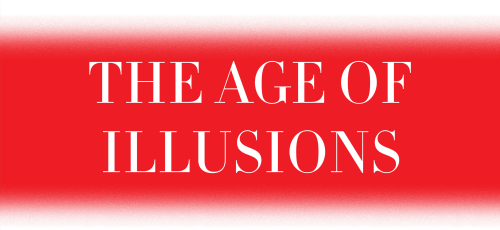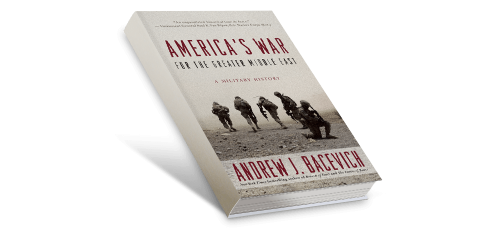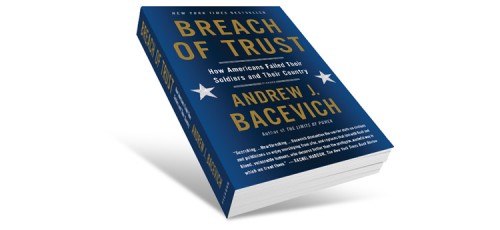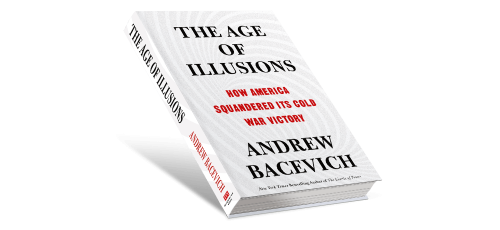
Biden the Bold vs. Joe the Timid
Andrew Bacevich
Is President Biden afflicted with the political equivalent of a split personality? His first several months in office suggest just that possibility. On the home front, the president’s inclination is clearly to Go Big. When it comes to America’s role in the world, however, Biden largely hews to pre-Trumpian precedent. So far at least, the administration’s overarching foreign-policy theme is Take It Slow.
“Joe Biden Is Electrifying America Like F.D.R.” So proclaimed the headline of a recent Nicholas Kristof column in the New York Times. Even allowing for a smidgen of hyperbole, the comparison is not without merit. Much like President Franklin Delano Roosevelt during his famous First Hundred Days in office in the midst of the Great Depression, Biden has launched a flurry of impressively ambitious domestic initiatives in the midst of the Great Pandemic — an American Rescue Plan, an American Jobs Plan, an American Families Plan, and most recently an environmental restoration program marketed as America the Beautiful.

The Specter of Isolationism
Andrew Bacevich
The so-called Age of Trump is also an age of instantly forgotten bestselling books, especially ones purporting to provide the inside scoop on what goes on within Donald Trump’s haphazard and continuously shifting orbit. With metronomic regularity, such gossipy volumes appear, make a splash, and almost as quickly vanish, leaving a mark no more lasting than a trout breaking the surface in a pond.
Remember when Michael Wolff’s Fire and Fury: Inside the Trump White House was all the rage? It’s now available in hardcover for $0.99 from online used booksellers. James Comey’s Higher Loyalty also sells for a penny less than a buck.
An additional forty-six cents will get you Omarosa Manigault Newman’s “insider’s account” of her short-lived tenure in that very White House. For the same price, you can acquire Sean Spicer’s memoir as Trump’s press secretary, Anthony Scaramucci’s rendering of his tumultuous 11-day stint as White House communications director, and Corey Lewandowski’s “inside story” of the 2016 presidential campaign.

A Play of Many Parts in One Act
Andrew Bacevich
It’s only mid-afternoon and Army Lieutenant General Victor Constant has already had a bad day.1 Soon after he arrived at the office at 0700, the Chief2 had called. “Come see me. We need to talk.”
The call was not unexpected. Any day now, POTUS3 will announce the next four-star to command the war effort in Afghanistan — how many have there been? — and Constant felt certain that he’d be tapped for the job. He’d certainly earned it. Multiple tours in Iraq and Afghanistan and, worse still, at the Pentagon. If anyone deserved that fourth star, he did.
Unfortunately, the Chief sees things differently. “Time’s up, Vic. I need you to retire.” Thirty-three years of service and this is what you get: your walking papers, with maybe a medal thrown in.

Then What?
Andrew Bacevich
Assume Joe Biden wins the presidency. Assume as well that he genuinely intends to repair the damage our country has sustained since we declared ourselves history’s “Indispensable Nation,” compounded by the traumatic events of 2020 that demolished whatever remnants of that claim survived. Assume, that is, that this aging career politician and creature of the Washington establishment really intends to salvage something of value from all that has been lost.
If he seriously intends to be more than a relic of pre-Trump liberal centrism, how exactly should President Biden go about making his mark?
Here, free of charge, Joe, is an action plan that will get you from Election Night through your first two weeks in office. Follow this plan and by your 100th day in the White House observers will be comparing you to at least one President Roosevelt, if not both.

Racism, Yes, But What About Militarism and Materialism?
Andrew Bacevich
In the wake of the police killing of George Floyd, Americans are finally — or is it once again? — confronting the racism that afflicts this country and extends into just about every corner of our national life. Something fundamental just might be happening.
Yet to state the obvious, we’ve been here before. Mass protests in response to racial inequality and discrimination, including police brutality, have been anything but unknown in the United States. Much the same can be said of riots targeting black Americans, fomented and exploited by white racists, often actively or passively abetted by local law enforcement officials. If Jamil Abdullah Al-Amin, formerly known as H. Rap Brown, was correct in calling violence “as American as cherry pie,” then race-related urban unrest is the apple-filled equivalent.
The optimists among us believe that “this time is different.” I hope events will prove them right. Yet recalling expectations that Barack Obama’s election in 2008 signaled the dawn of a “post-racial America,” I see no reason to expect it to be so. A yawning gap, I fear, separates hope from reality.

The Coronavirus and the Real Threats to American Safety and Freedom
Andrew Bacevich
Americans are facing “A Spring Unlike Any Before.” So warned a front-page headline in the March 13th New York Times.
That headline, however hyperbolic, was all too apt. The coming of spring has always promised relief from the discomforts of winter. Yet, far too often, it also brings its own calamities and afflictions.
According to the poet T.S. Eliot, “April is the cruelest month.” Yet while April has certainly delivered its share of cataclysms, March and May haven’t lagged far behind. In fact, cruelty has seldom been a respecter of seasons. The infamous influenza epidemic of 1918, frequently cited as a possible analogue to our current crisis, began in the spring of that year, but lasted well into 1919.

Or Going Off-Script in the Age of Trump
Andrew Bacevich
The impeachment of the president of the United States! Surely such a mega-historic event would reverberate for weeks or months, leaving in its wake no end of consequences, large and small. Wouldn’t it? Shouldn’t it?
Truth to tell, the word historic does get tossed around rather loosely these days. Just about anything that happens at the White House, for example, is deemed historic. Watch the cable news networks and you’ll hear the term employed regularly to describe everything from Oval Office addresses to Rose Garden pronouncements to press conferences in which foreign dignitaries listen passively while their presidential host pontificates about subjects that have nothing to do with them and everything to do with him.
Of course, almost all of these are carefully scripted performances that are devoid of authenticity. In short, they’re fraudulent. The politicians who participate in such performances know that it’s all a sham. So, too, do the reporters and commentators paid to “interpret” the news. So, too, does any semi-attentive, semi-informed citizen.
Yet on it goes, day in, day out, as politicians, journalists, and ordinary folk collaborate in manufacturing, propagating, and consuming a vast panoply of staged incidents, which together comprise what Americans choose to treat as the very stuff of contemporary history. “Pseudo-events” was the term that historian Daniel Boorstin coined to describe them in his classic 1961 book The Image: A Guide to Pseudo-Events in America. The accumulation of such incidents creates a make-believe world. As Boorstin put it, they give rise to a “thicket of unreality that stands between us and the facts of life.”

The “Revolution of ’89” Reassessed
Andrew Bacevich
Thirty years ago this month, President George H.W. Bush appeared before a joint session of Congress to deliver his first State of the Union Address, the first post-Cold War observance of this annual ritual. Just weeks before, the Berlin Wall had fallen. That event, the president declared, “marks the beginning of a new era in the world’s affairs.” The Cold War, that “long twilight struggle” (as President John F. Kennedy so famously described it), had just come to an abrupt end. A new day was dawning. President Bush seized the opportunity to explain just what that dawning signified.
“There are singular moments in history, dates that divide all that goes before from all that comes after,” the president said. The end of World War II had been just such a moment. In the decades that followed, 1945 provided “the common frame of reference, the compass points of the postwar era we’ve relied upon to understand ourselves.” Yet the hopeful developments of the year just concluded — Bush referred to them collectively as “the Revolution of ’89” — had initiated “a new era in the world’s affairs.”
While many things were certain to change, the president felt sure that one element of continuity would persist: the United States would determine history’s onward course. “America, not just the nation but an idea,” he emphasized, is and was sure to remain “alive in the minds of people everywhere.”

How America Squandered Its Cold War Victory
Andrew Bacevich

Donald Trump and the Ten Commandments (Plus One) of the National Security State
Andrew Bacevich
Let us stipulate at the outset that Donald Trump is a vulgar and dishonest fraud without a principled bone in his corpulent frame. Yet history is nothing if not a tale overflowing with irony. Despite his massive shortcomings, President Trump appears intent on recalibrating America’s role in the world. Initiating a long-overdue process of aligning U.S. policy with actually existing global conditions just may prove to be his providentially anointed function. Go figure.
The Valhalla of the Indispensable Nation is a capacious place, even if it celebrates mostly white and mostly male diversity. Recall that in the eighteenth century, it was a slaveholding planter from Virginia who secured American independence. In the nineteenth, an ambitious homespun lawyer from Illinois destroyed slavery, thereby clearing the way for his country to become a capitalist behemoth. In the middle third of the twentieth century, a crippled Hudson River grandee delivered the United States to the summit of global power. In that century’s difficult later decades, a washed-up movie actor declared that it was “morning in America” and so, however briefly, it seemed to be. Now, in the twenty-first century, to inaugurate the next phase of the American story, history has seemingly designated as its agent a New York real estate developer, casino bankruptee, and reality TV star.
In all likelihood, George Washington, Abraham Lincoln, Franklin Delano Roosevelt, and Ronald Reagan would balk at having Donald Trump classified as their peer. Yet, however preposterously, in our present moment of considerable crisis, he has succeeded them as the nation’s Great Helmsman, albeit one with few ideas about what course to set. Yet somehow Trump has concluded that our existing course has the United States headed toward the rocks. He just might be right.

Putting Donald Trump’s Impeachment in Context
Andrew Bacevich
There is blood in the water and frenzied sharks are closing in for the kill. Or so they think.
From the time of Donald Trump’s election, American elites have hungered for this moment. At long last, they have the 45th president of the United States cornered. In typically ham-handed fashion, Trump has given his adversaries the very means to destroy him politically. They will not waste the opportunity. Impeachment now — finally, some will say — qualifies as a virtual certainty.
No doubt many surprises lie ahead. Yet the Democrats controlling the House of Representatives have passed the point of no return. The time for prudential judgments — the Republican-controlled Senate will never convict, so why bother? — is gone for good. To back down now would expose the president’s pursuers as spineless cowards. The New York Times, the Washington Post, CNN, and MSNBC would not soon forgive such craven behavior.
So, as President Woodrow Wilson, speaking in 1919 put it, “The stage is set, the destiny disclosed. It has come about by no plan of our conceiving, but by the hand of God.” Of course, the issue back then was a notably weighty one: whether to ratify the Versailles Treaty. That it now concerns a “Mafia-like shakedown” orchestrated by one of Wilson’s successors tells us something about the trajectory of American politics over the course of the last century and it has not been a story of ascent.
Leaving a Misguided War and Choosing Not to Look Back
Andrew Bacevich
When the conflict that the Vietnamese refer to as the American War ended in April 1975, I was a U.S. Army captain attending a course at Fort Knox, Kentucky. In those days, the student body at any of our Army’s myriad schools typically included officers from the Army of the Republic of Vietnam (ARVN).
Since ARVN’s founding two decades earlier, the United States had assigned itself the task of professionalizing that fledgling military establishment. Based on a conviction that the standards, methods, and ethos of our armed forces were universally applicable and readily exportable, the attendance of ARVN personnel at such Army schools was believed to contribute to the professionalizing of the South Vietnamese military.
Evidence that the U.S. military’s own professional standards had recently taken a hit — memories of the My Lai massacre were then still fresh — elicited no second thoughts on our part. Association with American officers like me was sure to rub off on our South Vietnamese counterparts in ways that would make them better soldiers. So we professed to believe, even while subjecting that claim to no more scrutiny than we did the question of why most of us had spent a year or more of our lives participating in an obviously misbegotten and misguided war in Indochina.
For serving officers at that time one question in particular remained off-limits (though it had been posed incessantly for years by antiwar protestors in the streets of America): Why Vietnam? Prizing compliance as a precondition for upward mobility, military service rarely encourages critical thinking.

The Trump Era as an Occasion for Truth Telling
Andrew Bacevich
Irony, paradox, contradiction, consternation — these define the times in which we live. On the one hand, the 45th president of the United States is a shameless liar. On the other hand, his presidency offers an open invitation to Americans to confront myths about the way their country actually works. Donald Trump is a bullshit artist of the first order. Yet all art reflects the time in which it’s produced and Trump’s art is no exception. Within all the excrement lie nuggets of truth. Well before Trump rode the down escalator to the center of American politics, there were indicators aplenty that things had gone fundamentally awry. Yet only with the presidential election of 2016 did the chickens come home to roost. And with their arrival, it became apparent that more than a few propositions hitherto accepted as true are anything but. Let me offer seven illustrative examples of myths […]

War in the Shadows (of You Know Who)
Andrew Bacevich
The news, however defined, always contains a fair amount of pap. Since Donald Trump’s ascent to the presidency, however, the trivia quotient in the average American’s daily newsfeed has grown like so many toadstools in a compost heap, overshadowing or crowding out matters of real substance. We’re living in TrumpWorld, folks. Never in the history of journalism have so many reporters, editors, and pundits expended so much energy fixating on one particular target, while other larger prey frolic unmolested within sight. As diversion or entertainment — or as a way to make a buck or win 15 seconds of fame — this development is not without value. Yet the overall impact on our democracy is problematic. It’s as if all the nation’s sportswriters obsessed 24/7 about beating New England Patriots coach Bill Belichick. In TrumpWorld, journalistic importance now correlates with relevance to the ongoing saga of Donald J. Trump. To […]

